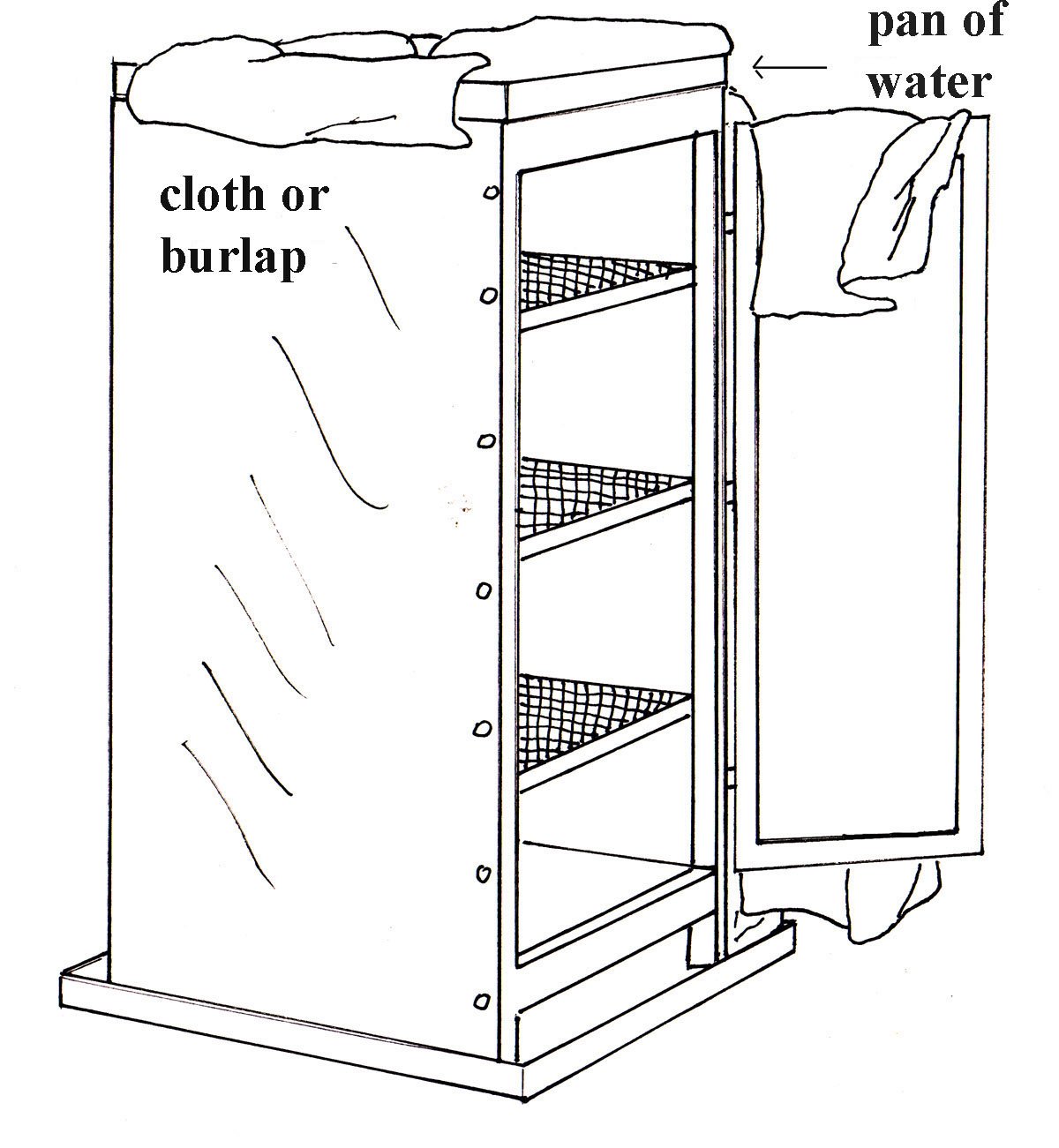Instructions for Making an Iceless Refrigerator
In the past these types of coolers were common in parts of the United States. I have seen them still in use in the American Southwest. They work best in a hot dry climate, since they depend on evaporation for cooling.
Make a wooden or PVC pipe frame approximately 48 -58 inches high by 12 -18 inches wide and deep. Cover the outside with a wire screen or hardware cloth. The covering should be something that preferably will not rust and will keep insects out. The top should be screen and the bottom solid. Make a door for one side and hang it on hinges or leather straps. Use a hook or a button for a latch.
The inside shelves can be fixed or adjustable and should be made of a frame covered with wire fencing such as chicken wire or hardware cloth. This will allow airflow.
Paint the wooden frames with whatever type of paint you have available. If you do not have paint, use linseed or cooking oil and give it time to dry.
Next, make a cover of burlap, flannel, or any heavy, coarse, water-absorbent cloth. Put the smooth side of the material on the outside. Attach the cover around the top of the frame with nails, buttons, etc. Leave a flap for the door to open.
Place a 2-4 inch deep pan on top of the frame. Sew strips of cloth to the top of the cover and extend them into the top pan. They will act as a wick to draw water into the cover.
Place a second pan under the bottom of the frame and make sure the bottom of the cover reaches into it.
Stand the refrigerator in a shady place where there is good airflow. The refrigerator works when you fill both pans with water. The water wicks into the cover and saturates it. The airflow causes an evaporative action similar to a swamp cooler. You can jump-start the refrigerator by first pouring water over the cover. The faster the rate of evaporation gets, the cooler the temperature.
A collapsible variation of this refrigerator was often used at campsites. It was hung from a tree branch out of the reach of animals.
These will by no means equal a modern refrigerator, but one that is working well reportedly can cool down into the 50’s F.
See the drawing below.
[/caption]
Howard


Ok I understand the principle having grown up with a swamp cooler but what i dont get it the why? Why would I devote valuable time and precious material to a device that cant protect food at the temps it MIGHT be capable of reaching?(https://www.fsis.usda.gov/factsheets/how_temperatures_affect_food/index.asp)
What can i do with it i guess is what I’m asking? Thanks for the help
Matt
I understand what you are saying and the information in the government fact sheet is something I would not disagree with. But I can remember when I was living with my Grandmother in England in the early 1950’s. She had no refrigerator and kept her leftovers in a cool pantry. While not perfect I think anything you can do to keep your food colder will help. There is also the moral aspect your wife and kids or grandchildren will appreciate a cool drink during a hot summer. They were pretty common in the Southwest, lots of people kept their milk and eggs in them
Howard
The evap cooling only works If the dew point is below 20 degrees should also be noted. That means the humidity for the most part is single digit meaning 9% or lower…..
Ok thanks
On a side note, your body and gut slowly adapts over time. I’ve got Filipino friends that leave their leftovers out on the counter all night and eat last night’s dinner for breakfast. That would make Courtney and I sick, but they do it all the time with no side effects.
It’s along the same line of thinking that you should not force your kids to wash their hands all the time, a little dirt is good and builds a stronger immune system. If we keep going down this line of thought, you’ll hear me tell you that you should also pick your nose and eat your boogers! Ha!
Robert
Actually, I did read somewhere that picking your nose and eating the boogers does confer some immunity!
Years ago we left food out on the counter all the time – in fact we colored Easter eggs two to three weeks before easter, left them on the counter and then ate them for Easter breakfast. I don’t remember anyone getting sick, ever. Not until processed food became the primary source of our diets.
Well, eggs are much ‘germier’ now than they were 40-50 years ago, I think…
That was a nice information for cooling of our food i like the way you should share such blogs with us thanks and keep sharing.
So logically thinking, if you build one of these inside your Root cellar, maybe wouldn’t it keep it much cooler? I’m in the planning stages of going off grid completely, so I want to get it right the first time… I’m 39, about to be a grandmother , I’m tired…